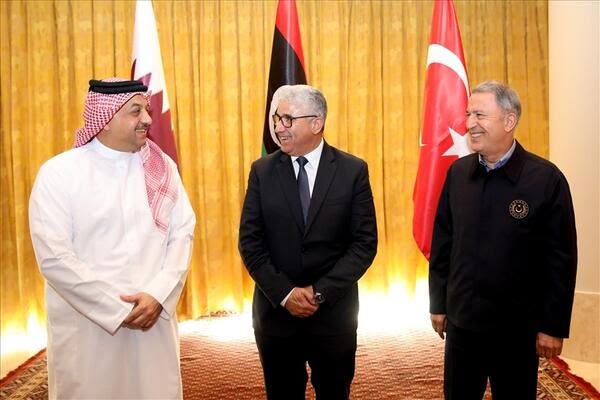Libya, Turkey, Qatar defense cooperation: will conflict in Libya continue?
As part of the deal, Turkey and Qatar will establish facilities in Libya for military training and consultancy and will send consultants and military personnel to Libya.

By IAR Desk
Libya has entered into a tripartite agreement with Qatar and Turkey for military agreement. This was announced by the Libyan defense minister Salah Al-Namroush on Monday, August 17th, in the wake of the visit to the country by the Turkish Defense Minister Hulusi Akar and the Qatari Defense Minister Khalid bin Mohammad Al-Attiyah. The deal will help boost the capabilities of the Libyan military, Turkish media said..
As part of the deal, Turkey and Qatar will establish facilities in Libya for military training and consultancy and will send consultants and military personnel to Libya. Al-Namroush told the media that Turkish and Qatari ministers emphasized that they support the political solution and the legitimate government.
Earlier in the day, Turkish Defense Minister Hulusi Akar held a trilateral meeting with his Qatari counterpart Khalid bin Mohammad Al Attiyah and Libyan premier Fayez al-Sarraj in Tripoli.
Turkish intervention in Libya
Turkey has intervened in Libya to bolster the Libyan Government of National Accord (GNA) which took charge of the oil rich country under a UN initiative in December 2015, following the overthrow and death of it’s leader Muammar Gaddafi. The GNA is challenged by the Libyan National Army of General Khalifa Haftae who holds sway in the oil rich regions of Eastern Libya.
On November 27, 2019, Ankara and Tripoli signed two MoUs; one on military cooperation and the other on maritime boundaries of countries in the Eastern Mediterranean.
Turkey militarily intervened in Libya in January 2020 after the Grand National Assembly of Turkey on 2 January 2020, passed a one-year mandate to deploy troops to Libya.
A Defense Security Cooperation and Training Assistance Advisory Command that was established as part of a memorandum of understanding between Turkey and Libya.
General Khalifa Haftar is supported by Egypt, the UAE, and Russia, amidst concerns that the GNA of premier Al Sarraj is affikaffil to the Muslim Brotherhood and committed to political Islam, which follows the same ideology of Turkish President Recep Tayip Erdogan’s AKP Party.
President Erdogan has said that Ankara may consider sending troops to Libya if the internationally recognised Tripoli government made such a request.
German Foreign Minister Heiko Maas was also on an official visit to the Libyan capital when the deal was announced..
While the GNA forces have been gaining ground in Eastern Libya, a ceasefire is far from being achieved.
Turkish-Qatari alliance
Qatar has been supporting the GNA and following the 2017 intra-Gulf rift between Qatar on one side and Saudi Arabia, Bahrain, and the UAE on the other, and the blockede on Qatar, has increasingly moved closer to Turkey. The gas rich monarchy hosts the Qatar-Turkey Combined Joint Force Command.
Qatar has also been supporting Turkey financially as the country faces an economic downturn. In 2018 Qatar pledged a $15 billion package to Turkey; more recently in May 2020 it once again pumped money into the ailing Turkish economy by tripling a currency swap agreement to the tune of $10 billion.
Turkey’s net foreign exchange reserves dropped from $40bn this year to $26bn, while the country’s mostly private sector-owned 12-month debt stands at around $168bn.
Monday’s announcement of the tripartite agreement between Libya, Turkey, and Qatar comes soon after the UAE and Israel announced on Thursday, August 13, their decision to normalize ties and establish full diplomatic relations, brokered by US President Donald Trump. Following the announcement the US announced it would sell F35 fighter planes to the Emirates.
The UAE-Israel deal will probably see a closer alliance between two ofoits main rivals – Qatar and Turkey. If Israel is persuaded to militarily intervene in Libya, the military conflict there may well continue for awhile longer.